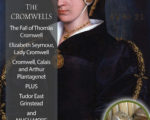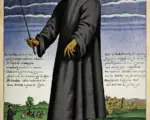John Blanke was a royal trumpeter and was employed as a musician at the court of Henry VII and Henry VIII, his first appearance at court being recorded in 1507. It is believed that John Blanke was of African descent; however, sadly, his age, date of birth, parentage, and place of birth all remain unknown to us.
It appears that John Blanke was part of a larger trend in Europe at the time in which rulers tended to employ African musicians. It is believed that this happened from as early as 1194 when it is documented that turbaned black trumpeters were involved in the procession of Henry VI, Holy Roman Emperor, into Palermo in Sicily. Scholars have suggested that Blanke arrived in England alongside Katherine of Aragon as part of her retinue when she came to marry Prince Arthur in 1501. Although we have evidence for an African presence in her retinue, there is no record of John Blanke being a member, so this is speculative. Also, given the fact that the Tudor court employed musicians from all over Europe, Blanke could have come from Spain, Portugal, or Italy, as these countries had an increasingly large African population.
[Read More...]






























